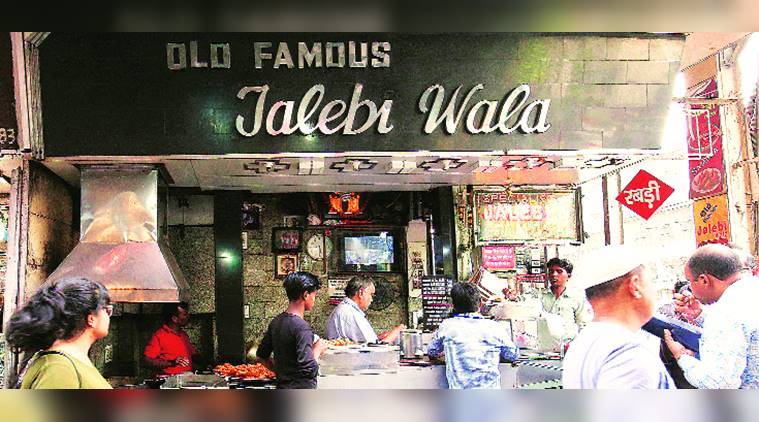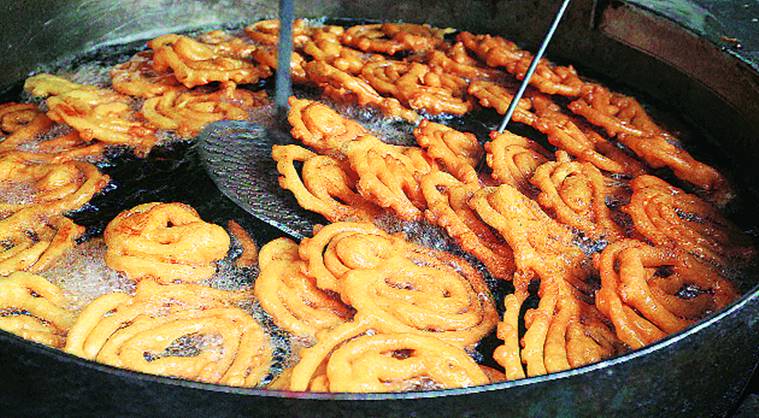 Sweet coils: The Old Famous Jalebi Wala shop in Chandni Chowk.
Sweet coils: The Old Famous Jalebi Wala shop in Chandni Chowk.
It’s early morning, streets in Chandni Chowk are deserted, the stove has not yet been lit and the boys squat to peel potatoes that will go into the samosas, the only other item that the Old Famous Jalebi Wala makes besides, of course, jalebas, a bigger variant of the familiar jalebi. Every batch of the thick and juicy sweet, doused in rabri, gets over as soon as it is laid to be served at the shop in the silver lane, Dariba Kalan.
Weighing 100g each, the round, pretzel-like sweet is deep-fried in desi ghee over coal-fire and dunked in syrup made with desi khandsari sugar, which gives the sweet its distinct taste.
In 1884, Nemi Chand Jain came to Delhi from Hari ki Garhi village near Uttar Pradesh’s Agra and set up the shop with his savings — Rs 2 received in dowry. His wife’s recipe of the sweet planted the seed of starting a business in Jain’s head. The family, then, used to live in “jalebiwali haveli” in the nearby Gali Khazanchi.
 Jalebis being fried.
Jalebis being fried.
Nemi Chand had two sons, Gyan Chand and Kailash Chand, who started sitting at the shop since 1970. The late Gyan Chand was 30 years older, and like a father, to Kailash Chand, 65, teaching him the tricks of the trade. After a family dispute in the 1980s, Gyan Chand’s sons started their own food shops in the area, later shifting to selling apparels, while the jalebi shop was manned by Kailash Chand and his son Abhishek, who lives in Civil Lines.
The shop’s name was rechristened after a Japanese feature story on them appeared in the 1950s. “The article was in Japanese, someone translated it for us, and they had written old famous jalebi wala,” says Abhishek, 40, though Kailash Chand chips in that the old timers still refer to the shop as Nemi Jalebi Wala just like in the early days.
Prime ministers till Manmohan Singh were regular patrons. Other patrons included Bollywood’s first family (the Kapoors), cricketers Chetan Chauhan and Bishan Singh Bedi, musician duo Dagar Brothers. “We used to always get orders on Rajiv Gandhi’s birthday. Actor Raj Kapoor was also a fan,” Kailash Chand says. The jalebas’ fame even crossed the borders and drew former Pakistani cricketers like Zaheer Abbas, Majid Khan and Wasim Bari to grab a bite on their India visits.
“Our speciality is a bigger and thicker jalebi and we make fresh khameer, that’s why our jalebis don’t get sour,” says Kailash Chand. Abhishek recalls his grandfather’s last words to his uncle: in raw materials, only the best should be used, and the business won’t have to face roadblocks; money will flow too. The ingredients are sourced from Khari Baoli, and ghee comes from Khurja, in UP’s Bulandshahr district. Abhishek recalls that a kilogram of jaleba that sold for Rs 30 in the 1980s is now priced at Rs 500.
Come winters, it’s mayhem at the shop. The Jains don’t bother about the revenue earned or expanding the business. “I don’t worry about money, as it is I don’t get time to spend it,” says Abhishek, laughing.